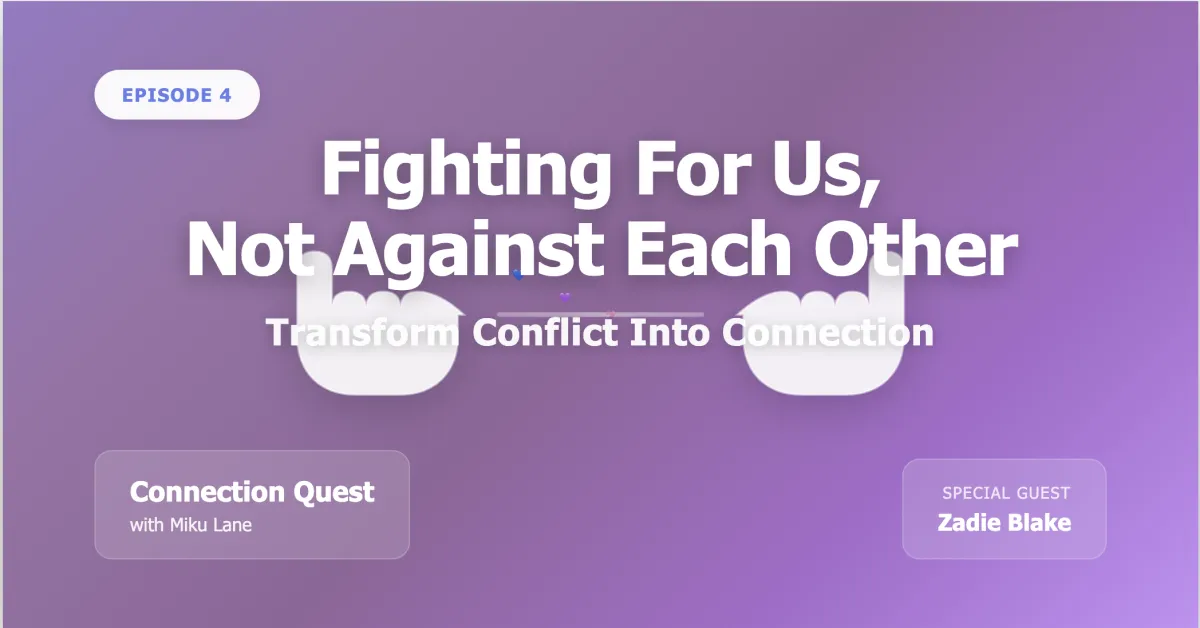
Fighting For Us, Not Against Each Other: Transforming Conflict into Connection
Originally featured on Connection Quest Episode 4 with Miku Lane and special guest Zadie Blake
Hey there, beautiful souls! Welcome back to another Connection Quest blog post. I'm Miku Lane, and today I'm excited to share insights from a conversation I had with the brilliant Zadie Blake, an expert in mental health and stress management. We dove deep into something every couple faces: conflict.

The Reality of Conflict in Relationships
Let's be real—if you're in a relationship, you're going to have conflicts. It's inevitable, and honestly? That's completely normal. But here's the thing that changed my perspective entirely: conflict doesn't have to be destructive. In fact, when approached with the right mindset, it can actually deepen your connection with your partner.
As Zadie wisely pointed out during our conversation, "It's not about avoiding conflict entirely but about navigating through it in a way that strengthens the bond with your partner."
What's Really Behind Your Arguments?
Here's something I've learned through my own relationships and countless conversations with others: the thing you're arguing about is rarely the real issue. That pile of dishes in the sink? It's probably not about the dishes at all. It's about feeling undervalued, unheard, or overwhelmed.
Zadie explained it perfectly: "Most conflicts boil down to unmet needs; it's often not about what's on the surface, like leaving dishes in the sink, but something deeper, like feeling undervalued or not heard."

Creating a Safe Space for Honest Communication
So how do we get to those deeper needs? It starts with creating emotional safety. Both partners need to feel they can express themselves without judgment, criticism, or defensiveness.
The Power of Active Listening
One of the most transformative tools Zadie shared is active listening. This isn't just hearing words—it's about:
Being fully present when your partner speaks
Reflecting back what you heard
Validating their feelings
Setting aside your defense mechanisms
Research backs this up too! Studies show that couples who practice active listening during conflicts report significantly higher relationship satisfaction.

Empathy: Your Secret Weapon
Empathy is what transforms a conflict from "me versus you" into "us versus the problem." When we put ourselves in our partner's shoes, something magical happens—the tension softens, defensiveness melts away, and compassion flows in.
I always try to remind myself: Why do I value this person? What do they mean to me? This simple shift in perspective can completely change the trajectory of a disagreement.
Zadie shared a powerful personal story about this. She once had a heated argument with a close friend about something trivial—who was supposed to book a dinner reservation. But when she paused and considered what might be happening beneath the surface, she realized her friend was under immense stress at work. Approaching with empathy didn't just resolve the conflict; it deepened their friendship.

The Bridge of Vulnerability
Here's something that might feel counterintuitive: being vulnerable during conflict is actually one of the most powerful things you can do. When you open up about your own feelings, fears, and insecurities, you invite your partner to do the same.
As Zadie beautifully put it, vulnerability is like saying, "I'm opening up this part of myself to you," which encourages your partner to lower their defenses too.
One practical way I use vulnerability is by expressing what I'm afraid of rather than attacking. It shows I'm coming from a place of concern, not combat.
The Magic of "I" Statements
Here's a game-changing communication technique: swap accusatory "you" statements for vulnerable "I" statements.
Instead of: "You never tell me your plans!"
Try: "I feel anxious when plans change last minute because I need time to prepare."
See the difference? The second approach invites understanding and collaboration rather than triggering defensiveness.

From Win-Lose to Learn-Grow
When both partners adopt this mindset, conflicts stop being about winning or losing. Instead, they become opportunities to:
Learn more about each other
Grow together as a couple
Become more attuned to each other's needs
Strengthen your emotional bond
[IMAGE SUGGESTION: Image of a couple laughing together or embracing after what looks like a serious conversation - showing the reconnection after conflict]

The Power of the Debrief
Here's something many couples skip: checking in after a conflict. Once things have calmed down, take time to reflect together:
What happened?
What triggered the conflict?
How did we each feel?
What could we do differently next time?
What did we learn?
Zadie emphasized that these post-conflict moments are when partners are often most open and receptive. Use that openness to strengthen your understanding and create better patterns for the future.
Your Conflict-to-Connection Toolkit
Let me leave you with the key takeaways from this conversation:
Create emotional safety - Make it okay to express needs without judgment
Practice active listening - Be fully present and validate feelings
Lead with empathy - See the situation from your partner's perspective
Embrace vulnerability - Share your fears, not just your frustrations
Use "I" statements - Express needs without blame
Debrief together - Reflect on conflicts to learn and grow
These tools might feel challenging at first, but little by little, you can transform the way you navigate disagreements. Remember: each conflict is an opportunity to connect more deeply if you approach it with the right mindset.
Join the Conversation
I'd love to hear from you! What strategies have helped you turn conflicts into deeper connections in your relationships? Drop a comment below and let's learn from each other.
And if you found this helpful, don't forget to check out the full episode of Connection Quest where Zadie and I dive even deeper into this topic.

Until next time, keep fighting for your relationship, not against each other.
With love and connection, Miku Lane
Want more relationship insights delivered straight to your inbox? Subscribe to the Connection Quest newsletter for weekly tips, stories, and tools to deepen your romantic connections.
